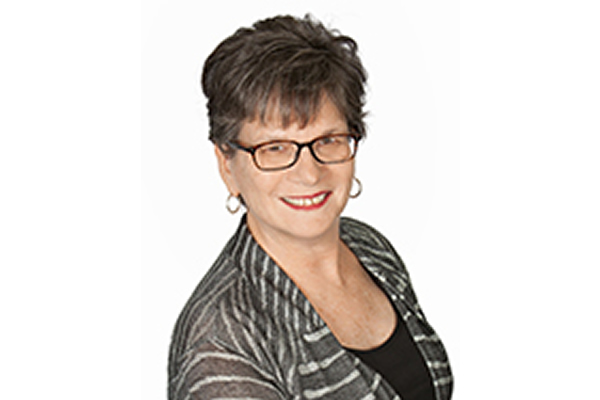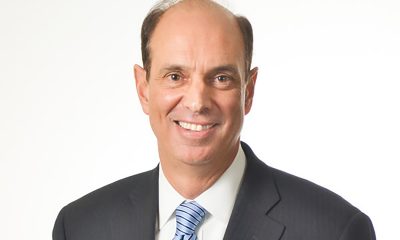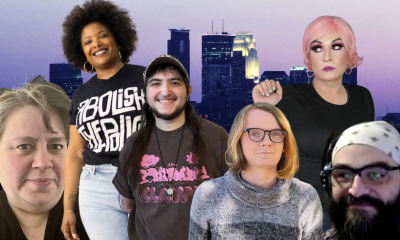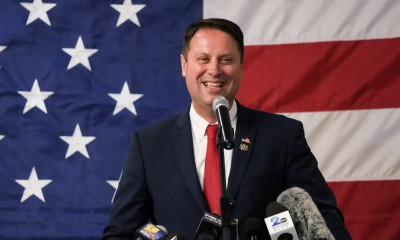Local
Rehoboth to elect new commissioners next week
3 candidates vying for two open seats in beach town


Pat Coluzzi is one of three candidates for two open seats on the Rehoboth Beach Board of Commissioners. (Photo courtesy Coluzzi)
REHOBOTH BEACH, Del. — This election cycle in Rehoboth sees three candidates running for two open seats on the Rehoboth Beach Board of Commissioners. The three candidates are Pat Coluzzi, Richard Byrne and Gary Glass.
Coluzzi, a lesbian former commissioner of Rehoboth who served from 2007 to 2013, has been a property owner in the town since 1994. She is the founder of Rehoboth Beach Farmers’ Market, a board member of the Center for the Inland Bays and a board member of the Lewes Rehoboth Canal Improvement Association. She is a former board member of Rehoboth Beach Main Street, was named the 2012 Rehoboth Beach Citizen of the Year, serves as president of the Rehoboth Beach Sister Cities Association and had a 30-year career in information technology.
“One of the things I think needs to be addressed is the parking issue in town,” Coluzzi said.
Coluzzi suggested the town needs more bike racks, shuttle buses that go into Rehoboth, a parking garage outside of town, different types of parking permits and other means of transportation. During her time as commissioner, Coluzzi started the implementation of a Bicycle Master Plan that provided for more locations around Rehoboth to have bike racks, wayfinding and on-road sharrows. Additionally, she created a plan for scooter parking in Rehoboth and began the process for modernizing payment for parking with ParkMobile.
“I am running for office because I feel I can contribute to making our city better,” wrote Coluzzi in the Cape Gazette. “I have a proven track record of successfully tackling a variety of issues over the years, and after a five-year break, I feel that I am uniquely positioned to address some of the issues that confront our city.”
In addition to finding a solution for parking, Coluzzi is looking to promote a plan that will beautify Rehoboth’s public parks and areas, create a tree ordinance that will preserve the town’s canopy along with providing for the right tree in the right place, foster an environment in which businesses can grow and be successful and create a plan that will make safety paramount for all pedestrians and bicyclists. She considers herself a “Community Candidate” and focuses on bringing the community together, citing her involvement with the Rehoboth Beach Farmers’ Market as one example in which she was able to accomplish this.
Glass and his partner, Brian, have had a second home in Rehoboth for about 20 years, and he has been coming to Rehoboth for decades. Glass serves as a member of the Boardwalk and Beach Committee in Rehoboth and as treasurer of the Country Club Estates Property Owners Association. Glass has worked as a cost accounting analyst, been the director of finance for two non-profit associations and holds a bachelor’s in accounting and finance from Louisiana State University.
“I think there needs to be a lot more fiscal management and responsibility of this city,” Glass said.
Glass argues that Rehoboth cannot make rash decisions when it comes to funding. He questions how much debt the city is willing to take on and says that there needs to be a focus on tomorrow instead of today when dealing with fiscal management.
Glass also lamented exorbitant rent prices for the downtown business community. He says businesses are forced to close, leaving vacant buildings in the downtown area and called for Rehoboth to reinvest in its business community.
When it comes to parking, Glass says that Rehoboth cannot accommodate everyone who comes to visit Rehoboth because it is only one square mile. His approach to the issue is to enforce the rules that are in place and mentions that there are other options, such as parking on Route 1. Glass says the priority for parking should be for those who own homes in Rehoboth.
Other issues Glass seeks to address are the right of LLCs to vote in city elections, the need for an up-to-date storm water run-off system and having a master plan for Rehoboth’s commercial district.
Glass said LLCs should not have the right to vote because he says the community does not know anything about them. Glass also cites an LLC’s ability to avoid paying transfer taxes and how it has been a problem in Delaware. Glass noted that LLCs should own property as a trust or as a person to vote in Rehoboth. Glass does, however, think that LLCs can provide insight and valuable knowledge to the community.
“It’s not about what I want, it’s about what we as a community want,” Glass said. “If I’m elected, I want to represent what the people want.”
Byrne and his wife, Sherri Wright, have been coming to Rehoboth for more than 25 years. They became property owners and part-time residents in 2002 and full-time residents in 2009. Their three children and their families also love Rehoboth Beach and come to visit several times each year.
Byrne directed programs in 4-H, Family Consumer Science and Agriculture at two major universities across the states of Minnesota and Maryland. He serves as president of the Sussex Family YMCA Board of Governors, member of the Delaware YMCA Association Board of Directors, immediate past vice president of the Delaware SPCA Board of Directors and president of the Park Place on the Canal Home Owners Association. Additionally, Byrne serves as chair of the Animal Issues Committee and as a member of the Mayor’s Advisory Committee on Trees in Rehoboth.
“Parking policies need to be comprehensive,” Byrne said. “Research indicates that when one change is made, it affects other aspects of the entire parking system, often resulting in unintended consequences.”
Byrne says that it is important the community respects the work of the Parking Advisory Committee, which is looking at ways to manage meters, permits and bike and scooter parking. Byrne said that a report in the near future will be vital for future planning on a solution to the issue of parking.
When it comes to neighborhoods and businesses, Byrne says that he will work to insure the quality of life is maintained, infrastructure is maintained and improved, zoning codes are fairly and strictly enforced and that residential zoning is for residential living. For the environment, Byrne is looking to fix the storm water runoff problem, preserve the health of the fresh water lakes, protect and improve the parks, grow the tree canopy, create safer bike lanes and reduce traffic to make Rehoboth more pedestrian friendly. Byrne wants to livestream commissioner and other important public meetings, host informal ‘listening’ meetings, elicit participation on issues, foster communication and be available around town.
“If elected, I commit to working collaboratively with other commissioners, the mayor, city committees, residents and businesses on preserving our neighborhoods, protecting our environment and improving our infrastructure,” Byrne said. “I will listen to people all over the city, take their ideas and concerns to the commission, and communicate back to them about the city’s plans and actions.”
Rehoboth Beach will hold its annual municipal election on Aug. 11 from 10 a.m. to 6 p.m. in the Convention Center located in the Municipal Building at 229 Rehoboth Ave. For any questions on the election, call 302-227-6181, ext. 108.
Virginia
Spanberger signs bill that paves way for marriage amendment repeal referendum
Proposal passed in two successive General Assembly sessions

Virginians this year will vote on whether to repeal a state constitutional amendment that defines marriage as between a man and a woman.
Democratic Gov. Abigail Spanberger on Friday signed state Del. Laura Jane Cohen (D-Fairfax County)’s House Bill 612, which finalized the referendum’s language.
The ballot question that voters will consider on Election Day is below:
Question: Should the Constitution of Virginia be amended to: (i) remove the ban on same-sex marriage; (ii) affirm that two adults may marry regardless of sex, gender, or race; and (iii) require all legally valid marriages to be treated equally under the law?
Voters in 2006 approved the Marshall-Newman Amendment.
Same-sex couples have been able to legally marry in Virginia since 2014. Former Gov. Glenn Youngkin, who is a Republican, in 2024 signed a bill that codified marriage equality in state law.
Two successive legislatures must approve a proposed constitutional amendment before it can go to the ballot.
A resolution to repeal the Marshall-Newman Amendment passed in the General Assembly in 2025. Lawmakers once again approved it last month.
“20 years after Virginia added a ban on same-sex marriage to our Constitution, we finally have the chance to right that wrong,” wrote Equality Virginia Executive Director Narissa Rahaman on Friday in a message to her group’s supporters.
Virginians this year will also consider proposed constitutional amendments that would guarantee reproductive rights and restore voting rights to convicted felons who have completed their sentences.
District of Columbia
D.C. non-profits find creative ways to aid the unhoused amid funding cuts
City’s poor economic mobility makes it easier to slip into homelessness

Homelessness is unlikely to disappear entirely, but it can be minimized and controlled.
That principle guides Everyone Home Executive Director Karen Cunningham’s approach to homeless support and prevention in D.C.
“There’s always going to be some amount of people who have a crisis,” Cunningham said. “The goal is that if they become homeless, [it’s] rare, brief and non-recurring. And in order for that to be the case, we need to have steady investments in programs that we know work over time.”
Making those investments has proven to be an unprecedented challenge, however. Cunningham said non-profits and other organizations like Everyone Home are grappling with government funding cuts or stalls that threaten the work they do to support D.C.’s homeless population.
Despite a 9% decrease in homelessness from 2024 to 2025, advocates worry that stagnant funding will make that progress hard to sustain. Furthermore, D.C. has the worst unemployment rate in the country at 6.7% as of December. The city’s poor economic mobility makes it easier for people to slip into homelessness and harder to break free of it.
There’s a way forward, Cunningham said, but it’s going to take a lot of perseverance and creative solutions from those willing to stay in the fight.
Fighting through setbacks
Reduced funding from the city government has shifted the way Everyone Home operates.
In D.C.’s fiscal year 2026 budget proposal, homeless services and prevention programs saw stalled growth or financial reductions. Even just a few years ago, Cunningham said Everyone Home received a large influx of vouchers to help people who needed long-term supportive housing. The vouchers allowed the non-profit to break people free of the homeless cycle and secure stable housing.
However, those vouchers are scarce these days. Cunningham said the city is investing less in multi-year programs and more in programs that offer preventative and upfront support.
She said this reality has forced Everyone Home to stop operating its Family Rapid Rehab program, which helps families leave shelters and transition into permanent housing. Current funds couldn’t withstand the size of the program and Cunningham said very few organizations can still afford to run similar programs.
The Family Homelessness Prevention program, however, is thriving and expanding at Everyone Home due to its short-term nature. It provides families with 90-day support services to help them get back on track and secure stable finances and housing.
Everyone Home also offers a drop-in day center, where they provide people with emergency clothing, laundry, and meals, and has a street outreach team to support those who are chronically homeless and offer services to them.
Inconsistencies in financial support have created challenges in providing the necessary resources to those struggling. It’s led non-profits like Everyone Home to get creative with their solutions to ensuring no one has recurring or long spouts of homelessness.
“It’s really a sustained investment in these programs and services that can allow us to chip away, because if you put all these resources in and then take your foot off the gas, there’s always people entering the system,” Cunningham said. “And so we have to always be moving people out into housing.”
Getting people in and out of the homeless system isn’t easy due to D.C.’s struggle with providing accessible and affordable housing, D.C. Policy Center executive director Yesim Sayin said in a Nov. 16 Washington Blade article.
Sayin said that D.C.’s construction tailors to middle or upper class people who live in the city because work brought them there, but it excludes families and D.C. natives who may be on the verge of homelessness and have less geographic mobility.
Building more and building smarter ensures D.C.’s low-income population aren’t left behind and at risk of becoming homeless, Sayin said.
That risk is a common one in D.C. given its low economic mobility. Residents have less room to financially grow given the city’s high cost of living, making vulnerable communities more prone to homelessness.
With funding cuts for long-term programs, preventative programs have proven to be vital in supporting the homeless population. When someone becomes homeless, it can have a snowball effect on their life. They aren’t just losing a house –– they may lose their job, access to reliable transportation and food for their family.
Cunningham said resources like the Family Homelessness Prevention program allows people to grow and stabilize before losing crucial life resources.
“Helping people keep what they have and to try to grow that as much as possible is really important where there aren’t a lot of opportunities…for people to increase their income,” Cunningham said.
Through all the funding cuts and reduced services, D.C.’s homeless support organizations are still finding a path forward –– a path that many residents and families rely on to survive.
Pushing forward
Local non-profits and organizations like Everyone Home are the backbone of homeless support when all other systems fail.
When the White House issued an executive order directing agencies to remove homeless encampments on federal land, Coalition For The Homeless provided ongoing shelter to those impacted.
“We were asked by our funders to open two shelters at the time of the encampment policy announcement,” Lucho Vásquez, executive director of Coalition For The Homeless, said. “We opened the shelters on the same day of the request and have been housing 100 more people who are unhoused each night since August.”
This was achieved even after Coalition faced “severe cuts in funding for supportive and security services,” according to Vásquez. Staff members have taken on additional responsibilities to make up for the loss in security coverage and supportive services with no increase in pay, but Vásquez said they’re still trying to fill gaps left by the cuts.
Coalition offers free transitional housing, single room occupancy units and affordable apartments to people who were unhoused.
Coalition For The Homeless isn’t the only non-profit that’s had to step up its services amid dwindling resources. Thrive D.C. provides hot meals, showers, and winter clothes, which is especially important during the winter months.
Pathways to Housing D.C. offers housing services for people regardless of their situation or condition. Its “Housing First” teams house people directly from the streets, and then evaluate their mental and physical health, employment, addiction status, and education challenges to try to integrate them back into the community.
Covenant House is a homeless shelter for youth ages 18-24. They provide resources and shelter for youth “while empowering young people in their journey to independence and stability,” its website reads. Through its variety of programs, Friendship Place ended or prevented homelessness, found employment and provided life-changing services for more than 5,400 people.
These groups have made a huge local difference with little resources, but Cunningham said there are more ways for people to support those experiencing homelessness if they’re strapped for time or money. Aside from donating and volunteering, she said even simply showing compassion toward people who are struggling can go a long way.
Cunningham said compassion is something that’s been lost in the mainstream, with politicians and news anchors regularly directing hostile rhetoric toward homeless populations. But now more than ever, she said caring and understanding for fellow community members is key to moving forward and lifting those in need up.
“People sometimes feel invisible or that there’s a sense of hostility,” Cunningham said. “I think all of us can at least do that piece of recognizing people’s humanity.”
(This article is part of a national initiative exploring how geography, policy, and local conditions influence access to opportunity. Find more stories at economicopportunitylab.com.)
District of Columbia
D.C. bar Rush facing eviction on charge of failing to pay rent
Landlord says $201,324 owed in back payments, late fees

The owners of the building at 14th and U Streets, N.W. where D.C.’s newest LGBTQ bar and nightclub Rush opened on Dec. 5, 2025, filed a complaint in D.C. Superior Court on Feb. 3 seeking Rush’s eviction on grounds that the bar has failed to pay its required rent since last May.
According to the court filing by building owners Thomas and Ioanna Tsianakas Family Trust and Thomas Tsianakas Trustee, Rush owes $141,338.18 in back rent, $19,086.19 for utilities, and $40,900 in late fees, coming to a total of $201,324.37.
Rush owner Jackson Mosley didn’t immediately respond to a Feb. 5 phone message from the Washington Blade seeking comment on the court filing seeking his eviction from the building located at 200114th Street, N.W., with its entrance around the corner on U Street.
WUSA 9 TV news reported in a Feb. 5 broadcast that Mosley said he “doesn’t see why the eviction notice is news and called it a ‘formality.’” The WUSA report adds that Mosley said he and the Rush landlord “have no bad blood” and if the action did reach the point of eviction he would file for Chapter 11 bankruptcy to restructure the lease and his debts.
The eviction court filing follows a decision by the city’s Alcoholic Beverage and Cannabis Board on Dec. 17 to suspend Rush’s liquor license on grounds that its payment check for the liquor licensing fee was “returned unpaid.” The liquor board reissued the license three days later after Mosley paid the fee with another check
He told the Blade at the time that the first check did not “bounce,” as rumors in the community claimed. He said he made a decision to put a “hold” on the check so that Rush could change its initial decision to submit a payment for the license for three years and instead to arrange for a lower payment for just one year at a time.
Around that same time several Rush employees posted social media messages saying the staff was not paid for the bar’s first month’s pay period. Mosley responded by posting a message on the Rush website saying employees were not paid because of a “tax related mismatch between federal and District records,” which, among other things, involved the IRS.
“This discrepancy triggered a compliance hold within our payroll system,” his statement said. “The moment I became aware of the issue I immediately engaged our payroll provider and began working to resolve it,” he said.
But WUSA 9 reports in its Feb. 5 broadcast about the eviction issue that at least some of the now former employees say they still have not been paid since their first paycheck failed to come on Dec. 15.
Superior Court online records for the eviction case show that a “Remote Initial Hearing” for the case has been scheduled for March 30 before a Landlord & Tenant Judge.




















